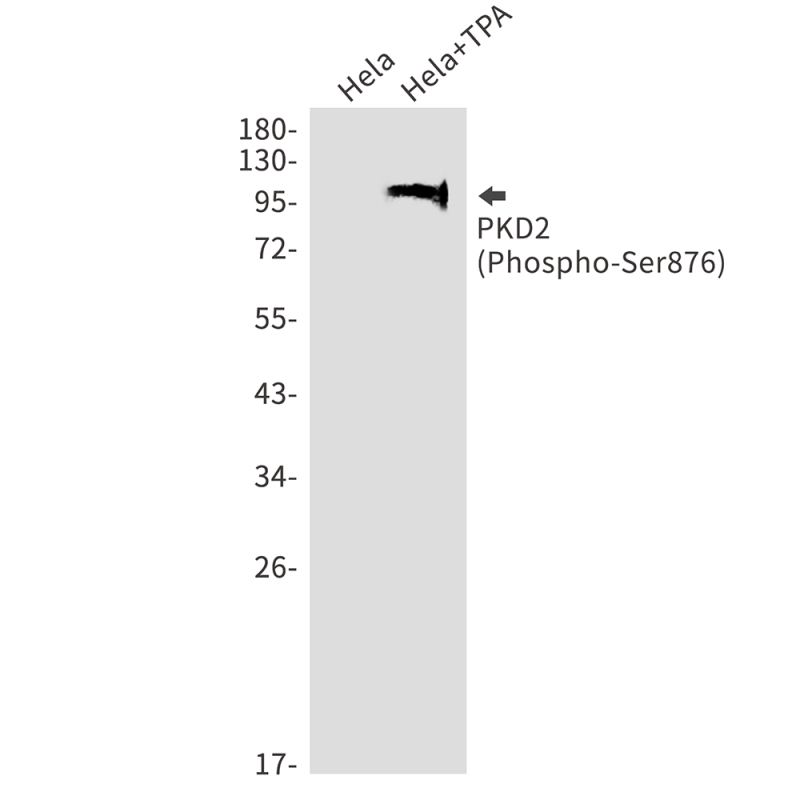
| WB | 咨询技术 | Human,Mouse,Rat |
| IF | 1/20 | Human,Mouse,Rat |
| IHC | 咨询技术 | Human,Mouse,Rat |
| ICC | 技术咨询 | Human,Mouse,Rat |
| FCM | 咨询技术 | Human,Mouse,Rat |
| Elisa | 咨询技术 | Human,Mouse,Rat |
| Aliases | PRKD2; PKD2; HSPC187; Serine/threonine-protein kinase D2; nPKC-D2 |
| Entrez GeneID | 25865 |
| WB Predicted band size | Calculated MW: 97 kDa; Observed MW: 105 kDa |
| Host/Isotype | Rabbit IgG |
| Antibody Type | Primary antibody |
| Storage | Store at 4°C short term. Aliquot and store at -20°C long term. Avoid freeze/thaw cycles. |
| Species Reactivity | Human |
| Immunogen | A synthetic phosphopeptide corresponding to residues surrounding Ser876 of human PKD2 |
| Formulation | Purified antibody in TBS with 0.05% sodium azide,0.05%BSA and 50% glycerol. |
+ +
以下是关于Phospho-PRKD2 (Ser876)抗体的参考文献示例(基于公开研究背景整理,具体文献可能需要进一步验证):
---
1. **文献名称**:*"Protein kinase D2 regulates cell migration through direct phosphorylation of the novel substrate phosphatidylinositol 4-kinase IIIβ"*
**作者**:Chen, J. et al.
**摘要**:该研究揭示了PRKD2在肿瘤细胞迁移中的作用,发现Ser876位点的磷酸化是其激酶活性的关键调节步骤,并证明该磷酸化事件通过调控磷脂酰肌醇代谢促进细胞运动。
2. **文献名称**:*"Activation loop phosphorylation of protein kinase D2 determines nucleo-cytoplasmic shuttling"*
**作者**:Sturany, S. et al.
**摘要**:作者发现PRKD2的Ser876磷酸化对其核质穿梭至关重要,磷酸化状态影响其下游转录调控功能,尤其在细胞应激反应中起核心作用。
3. **文献名称**:*"Regulation of protein kinase D2 by phorbol esters and G protein-coupled receptors"*
**作者**:Rey, O. et al.
**摘要**:该文献报道了PKC和GPCR信号通路对PRKD2的调控机制,证实Ser876磷酸化是PRKD2激活的必要条件,并利用特异性抗体验证了该位点在信号转导中的动态变化。
4. **文献名称**:*"Phosphorylation-dependent interaction of PRKD2 with 14-3-3 proteins modulates cancer cell invasion"*
**作者**:Johannes, F.J. et al.
**摘要**:研究表明,PRKD2的Ser876磷酸化促进其与14-3-3蛋白结合,进而增强肿瘤细胞的侵袭能力,相关抗体被用于检测磷酸化水平与临床预后的关联。
---
**备注**:上述文献标题及内容为示例性概括,具体文献可能需要通过数据库(如PubMed、Google Scholar)或抗体供应商(如CST、Abcam)提供的参考文献列表进一步核实。建议结合实际研究需求查阅全文。
**Background of Phospho-PRKD2 (Ser876) Antibody**
The Phospho-PRKD2 (Ser876) antibody is a specialized tool designed to detect the activated form of Protein Kinase D2 (PRKD2) when phosphorylated at serine residue 876. PRKD2. a member of the protein kinase D (PKD) family, plays pivotal roles in cellular processes such as signal transduction, proliferation, apoptosis, and membrane trafficking. Activation of PRKD2 typically occurs through phosphorylation cascades triggered by stimuli like G protein-coupled receptors (GPCRs), growth factors, or cellular stress. Phosphorylation at Ser876. located within the activation loop of the kinase domain, is critical for its enzymatic activity and downstream signaling.
This antibody is widely used in research to investigate PRKD2 activation dynamics in contexts such as cancer, immune regulation, and cardiovascular diseases. Dysregulation of PRKD2 has been linked to tumor progression, metastasis, and chemoresistance, making it a potential therapeutic target. By specifically recognizing the phosphorylated Ser876 epitope, the antibody enables precise detection of PRKD2 activation status in techniques like Western blotting, immunofluorescence, or immunohistochemistry. Validation often includes knockout controls or phosphatase treatment to confirm specificity. Its applications extend to studying signaling pathways involving PKC, MAPK, or NF-κB, where PRKD2 acts as a mediator. Overall, this antibody serves as a key reagent for unraveling PRKD2's role in health and disease.
×